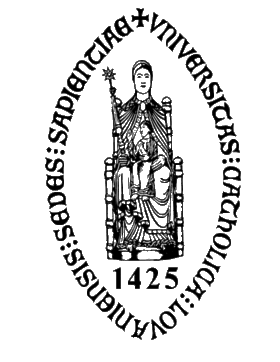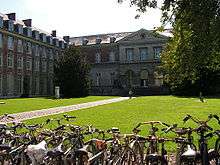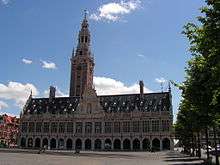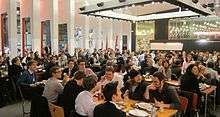Katholieke Universiteit Leuven
 | |
| Latin: Universitas Lovaniensis | |
| Motto | Sedes Sapientiae (Latin) |
|---|---|
Motto in English |
Seat of Wisdom or Seat of Knowledge |
| Type | Independent/Free catholic university |
| Established | 1425A, 1834, 1970 |
| Endowment | € 950 million |
| Chairman | Herman baron Daems |
| Chancellor | Mgr. André-Joseph Léonard |
| Rector | Rik Torfs |
Administrative staff | 11,534 |
| Students | 55,484 (2014-15) |
| 4,272 | |
| Location |
Leuven, 50°52′41″N 4°42′00″E / 50.878°N 4.700°ECoordinates: 50°52′41″N 4°42′00″E / 50.878°N 4.700°E |
| Campus | Main (urban) campus in Leuven and satellite campuses in Aalst, Antwerp, Bruges, Brussels, Diepenbeek, Geel, Ghent, Kortrijk, Ostend and Sint-Katelijne-Waver |
| Colors | Blue and white |
| Mascot | Fons Sapientiae |
| Affiliations |
CLUSTER Coimbra Group EUA, LERU CESAER EQUIS EASN |
| Website | www.kuleuven.be |
| Data as of 2014 | |
The Katholieke Universiteit Leuven (Dutch pronunciation: [katoˈlikə ynivɛrsiˈtɛit ˈløːvə(n)], ![]() listen ; Dutch for Catholic University of Leuven, but usually not translated into English to avoid confusion with the Catholic University of Leuven (1834–1968)), also known as KU Leuven[1][2] or University of Leuven, is a Dutch-speaking university in Leuven, Flanders, Belgium.
listen ; Dutch for Catholic University of Leuven, but usually not translated into English to avoid confusion with the Catholic University of Leuven (1834–1968)), also known as KU Leuven[1][2] or University of Leuven, is a Dutch-speaking university in Leuven, Flanders, Belgium.
The University of Leuven was founded at the centre of the historic town of Leuven in 1425, making it Belgium's first university. After being closed in 1797 during the Napoleonic period, the Catholic University of Leuven was "re-founded" in 1834, and is frequently, but controversially, identified as a continuation of the older institution.A In 1968 the Catholic University of Leuven split into the Dutch-language Katholieke Universiteit Leuven and the French-language Université catholique de Louvain, which moved to Louvain-la-Neuve in Wallonia. Since the fifteenth century, Louvain, as it is still often called by French speaking Belgians (Flemish speaking Belgians always use Leuven), has been a major contributor to the development of Catholic theology. It is considered the oldest Catholic university still in existence.
With 55,484 students in 2014–2015, the KU Leuven is the largest university in Belgium and the Low Countries. In addition to its primary campus in Leuven, it has satellite campuses in Kortrijk ('KULAK'), Antwerp, Ghent, Bruges, Ostend, Geel, Diepenbeek, Aalst, Sint-Katelijne-Waver and in Belgium's capital Brussels.[3] The university now also offers several programs in English.[4]
As of 2016-2017 academic year, KU Leuven ranks as 40th globally according to Times Higher Education,[5] 79th according to QS World University Rankings[6] and 93rd according to the Academic Ranking of World Universities.[7] KU Leuven is consistently considered to be within the top 100 universities of the world and in contention with Ghent University as the best Belgian university.
General description

The KU Leuven is a strongly research-oriented university. Among its many accolades is to be reckoned among the top universities of Europe. In the 2015-2016 Times Higher Education Supplement (THES) university ranking, the KU Leuven was ranked 35th in the world and 12th in Europe, making it the highest ranked university from the low countries (The Netherlands, Belgium and Luxembourg) in either category.[5] Its current 2015-2016 QS World University Ranking position is 82nd.[6] KU Leuven Institute of Philosophy current ranks 24th in the world.[8] In 2016, KU Leuven was ranked first on the Reuters' list of Europe's most innovative universities.[9]
KU Leuven Law School currently ranks 26th in the world.[10]
In the 2014-2015 Academic Year, 55,484 students were attending classes at the 15 faculties of the KU Leuven, 9,930 of whom were foreign students, many of whom were able to follow courses offered in English.[11] Most courses, however, are taught in Dutch. The KU Leuven is a member of the Coimbra Group (a network of leading European universities) as well as of the LERU Group (League of European Research Universities). Since November 2014, KU Leuven's Faculty of Economics and Business is accredited by European Quality Improvement System, which is a leading accreditation system specializing in higher education institutions of management and business administration.[12]
Since August 2013, the university has been led by Rik Torfs who replaced former rector Mark Waer. The Belgian archbishop, André-Joseph Léonard is the current Grand Chancellor and a member of the university board.
The KU Leuven is dedicated to Mary, the mother of Jesus, under her traditional attribute as 'Seat of Wisdom', and organizes an annual celebration on 2 February in her honour. On that day, the university also awards its honorary doctorates. The seal used by the university shows the medieval statue of the Sedes Sapientiae, Leuven, in a vesica piscis shape. Despite its Catholic origin, the university welcomes students from different faith communities.
In Flanders, the KU Leuven has a Catholic origin, whereas the University of Ghent and the University of Antwerp are officially neutral on issues of religious/philosophical orientation, and the Free University of Brussels is Freethinking.[13]
History

- For the history of the pre-1970 university see Catholic University of Leuven (1834–1968).
In 1968, tensions between the Dutch-speaking and French-speaking communities led to the splitting of the bilingual Catholic University of Leuven into two "sister" universities, with the Dutch-language university becoming a fully functioning independent institution in Leuven in 1970, and the Université Catholique de Louvain departing to a newly built greenfield campus site in the French-speaking part of Belgium. Pieter De Somer became the first rector of the KU Leuven.
In 1972, the KU Leuven set up a separate entity, "Leuven Research & Development" (LRD), to support industrial and commercial applications of university research. It has led to numerous spin-offs, such as the technology company Metris, and manages tens of millions of euros in investments and venture capital.
On 11 July 2002, the KU Leuven became the dominant institution in the "KU Leuven Association" (see below).
Programs
The table below provides an overview of the courses offered by the faculties of the University of Leuven in English. For the Dutch programs go to KU Leuven - opleidingen. There are 4 English bachelor programs and many different Master programs in English.
| Bachelor's degrees | Master's degrees | Advanced master's degrees |
|---|---|---|
| Faculty of Kinesiology and Rehabilitation Sciences | ||
|
| |
| Faculty of Bioscience Engineering | ||
|
||
| Faculteit of Economics & Business | ||
|
|
|
| Faculty of Pharmaceutical Sciences | ||
| Faculty of Medicine | ||
|
| |
| Faculty of Theology and Religious Studies | ||
|
|
|
| Faculty of Engineering Science | ||
|
(Only as a Master-after-Master)
| |
| Faculty of Engineering Technology (Leuven, Aalst, Diepenbeek, Geel, Gent, Oostende of Sint-Katelijne-Waver) | ||
|
|
|
| Faculty of Arts | ||
|
| |
| Faculty of Architecture | ||
|
||
| Faculty of Psychology and Educational Sciences | ||
|
||
| Faculty of Law | ||
|
| |
| Faculty of Social Sciences | ||
|
| |
| Faculty of Science | ||
|
| |
| Faculty of Canon Law | ||
|
| |
| Institute of Philosophy | ||
|
|
|
Library

- For the history of the university library prior to 1970, see Catholic University of Leuven (1834–1968).
When the university was split, those books that could not be divided otherwise (e.g. according to the wishes of the benefactors who donated them) were divided as follows: those with an odd-numbered shelfmark stayed in Leuven, while the even-numbered ones moved to Louvain-la-Neuve. This gave rise to the widespread myth that every other volume was separated - splitting up runs of journals and volumes of encyclopedias - but since such series each had a single shelfmark this was never in fact the case. The Central Library alone now owns about 1,300,000 works.
Inside Room 07.30 of the Faculteit Letteren is the Belgian Association of Japanese Language Teachers (ベルギー日本語教師会 Berugi Nihongo Kyōshikai; BNK) book case of materials for teaching the Japanese language.[14]
University Hospital
UZ Leuven (Universitair ziekenhuis Leuven) is the teaching hospital associated with the KU Leuven. Its most well known and largest campus is Gasthuisberg (literally 'guest house hill') and also houses the majority of auditoria of the faculty of medicine and the faculty of Pharmaceutical sciences.
Rectors
| # | Name | Began office | Ended office | Studies | Vice-rector |
|---|---|---|---|---|---|
| 1 | Pieter De Somer | 1968 | 1985 | Medicine | |
| 2 | Roger Dillemans | 1985 | 1995 | Law | |
| 3 | André Oosterlinck | 1995 | 2005 | Engineering | |
| 4 | Marc Vervenne | 2005 | 2009 | Theology | Mark Waer |
| 5 | Mark Waer | 2009 | 2013 | Medicine | |
| 6 | Rik Torfs | 2013 | Canon Law |
Notable alumni
- For pre-1970 alumni see Catholic University of Leuven (1834–1968)#Notable alumni.
- Leon Bekaert (b. 1958), economics, businessman
- Paul Bulcke (b. 1954), economics, businessman, CEO of Nestlé
- Jan Callewaert, economics, founder of Option N.V.
- Mathew Chandrankunnel (b. 1958), professor of philosophy of science at Dharmaram Vidya Kshetram
- Mathias Cormann (b. 1970), Belgian-born Australian Senator and Minister for Finance
- Jo Cornu, engineer, since 2013 CEO of the National Railway Company of Belgium.
- Joan Daemen (b. 1965), cryptographer, one of the designers of Advanced Encryption Standard (AES).
- Julien De Wilde (b. 1967), civil engineer, businessman
- Noël Devisch (b. 1943 ), agriculture
- Gabriel Fehervari, (b. 1970) law, businessman
- Willy Geysen, law, head of the Centre for Intellectual Property Rights (CIR)
- Luce Irigaray (b. 1930) philosopher
- Dr. A. Q. Khan (b. 1935), Founder of Pakistan's Nuclear Program.
- Georges Meekers (b. 1965), Belgian-born wine writer and educator
- Simon Mignolet (b. 1988), goalkeeper
- Martin Moors, philosopher
- Chantal Mouffe, (b. 1943), philosopher
- Rudi Pauwels, pharmacologist, (b. 1960) co-founder of Tibotec and Virco
- Vincent Rijmen (b. 1970), cryptographer, one of the designers of Advanced Encryption Standard (AES).
- Fulton J. Sheen (b. 1895), Roman Catholic Bishop, open cause for canonization (currently "Venerable")
- Guðmundur Steingrímsson (b. 1972), Icelandic politician
- Francine Swiggers, economics, businesswoman
- Marc Van Ranst (b. 1965), physician, virologist
- Herman Van Rompuy (b. 1947), Belgian statesman. Appointed President of the European Council in November 2009.
- Jef Valkeniers, doctor and politician
- Frans Vanistendael, law
- Catherine Verfaillie, (b. 1957) physician, stem cell scientist
- Koen Vervaeke (b. 1959), history, diplomat
Honorary doctorates
Notable recipients of honorary doctorates at the Katholieke Universiteit Leuven include:
- Baudouin of Belgium (1951), King of the Belgians
- Albert II of Belgium (1961), King of the Belgians
- Timothy Garton Ash (2011), British historian and Professor of European Studies, University of Oxford
- Michelle Bachelet (2015), President of Chile
- Abhijit Banerjee (2014), Indian economist, Massachusetts Institute of Technology
- Patriarch Bartholomew I of Constantinople (1996)
- Roberto Benigni (2007), Italian actor, comedian, screenwriter and director of film, theatre and television.
- John Braithwaite (2008), Australian criminologist (application of the idea of restorative justice to business regulation and peacebuilding
- Manuel Castells (2004), Professor of Sociology, Open University of Catalonia, University of Southern California
- Leon O. Chua (2013), professor in the electrical engineering and computer sciences department at the University of California, Berkeley
- Carla Del Ponte (2002), former Chief prosecutor of two United Nations international criminal law tribunals
- Jared Diamond (2008), professor of Geography and Physiology, UCLA
- Jacques Derrida (1989), French philosopher
- John Kenneth Galbraith (1972), Canadian economist
- Nadine Gordimer (1980), South African author, Booker Prize 1974, Nobel Prize in Literature 1991
- Alan Greenspan (1997), economist, former chairman of the Board of Governors of the US Federal Reserve
- Eugène Ionesco (1977), Romanian and French playwright
- Ban Ki-moon (2015), Secretary-General of the United Nations
- Helmut Kohl (1996), former Chancellor of Germany
- Christine Lagarde (2012), Managing Director of the International Monetary Fund (IMF)
- Mario Vargas Llosa (2003), Peruvian writer
- Michael Marmot (2014), British epidemiologist, University College London
- Martha Nussbaum (1997), American philosopher, University of Chicago
- Dirk Obbink, Lecturer in Papyrology and Greek Literature at Oxford University and the head of the Oxyrhynchus Papyri Project.
- Roger Penrose (2005), professor in Mathematical Physics, University of Oxford
- Navi Pillay (2012), United Nations High Commissioner for Human Rights
- Thomas S. Popkewitz (2004), professor of curriculum theory, University of Wisconsin-Madison School of Education
- Mary Robinson (2000), former President of Ireland
- Jacques Rogge (2012), President of the International Olympic Committee (IOC)
- Oscar Arnulfo Romero (1980), archbishop of San Salvador (El Salvador), human rights activist
- Helmut Schmidt (1983), former Chancellor of Germany
- Nate Silver (2013), American author and statistician
- Fiona Stanley (2014), Australian epidemiologist
- Rowan Williams (2011), Archbishop of Canterbury
Organisations

Notable divisions of the university include the Higher Institute of Philosophy and the Rega Institute for Medical Research.
The university is a member of the Flanders Interuniversity Institute of Biotechnology (VIB). The Interuniversity Microelectronics Centre (IMEC) is a spin-off company of the university.
The students of the university are gathered together in the student's society LOKO. They have representatives in most meetings at the university, including the Board of Directors.
Since July 2002, thirteen higher education institutes have formed the K.U.Leuven Association. The members are:[15]
- Hogeschool-Universiteit Brussel divided into Odisee (Professional) and a KUL Brussels (Academic) as from 2013
- Groep T
- Hogeschool voor Kunsten en Architectuur
- Hogeschool Sint-Lukas Brussel
- Lemmensinstituut
- Media & Design Academie
- Hogeschool voor Wetenschap en Kunst
- Katholieke Hogeschool Brugge-Oostende (KHBO)
- Katholieke Hogeschool Kempen
- Katholieke Hogeschool Leuven
- Katholieke Hogeschool Limburg (KHLim)
- Lessius Mechelen
- Katholieke Hogeschool Sint-Lieven (KaHo Sint-Lieven)
- Katholieke Hogeschool Zuid-West-Vlaanderen (KATHO)
- Lessius Hogeschool
- Katholieke Universiteit Leuven
Electronic learning environment: TOLEDO
Toledo, which started in September 2001, was gradually developed into the central electronic learning environment at the Association KU Leuven.
The word is an acronym for "TOetsen en LEren Doeltreffend Ondersteunen" (English: effectively supporting testing and learning). It is the collective name for a number of commercial software programs and tools, such as Blackboard. The project offers the Question Mark Perception assignment software to all institution members and has implemented the Ariadne KPS to reuse digital learning objects inside the Blackboard environment.
International acclaim
| University rankings | |
|---|---|
| Global | |
| ARWU[16] | 93 |
| Times[17] | 35 |
| QS[18] | 79 |
| Europe | |
| ARWU[19] | 32 |
| Times[20] | 12 |
| QS[21] | 26 |
In 2016, the Academic Ranking of World Universities ranked the Katholieke Universiteit Leuven as the world's 93rd best university,[7] while the Times Higher Education ranked KU Leuven 35th best university[5] and QS World University Rankings ranked KU Leuven 79th overall in the world.[6] In 2016, KU Leuven was ranked first on the Reuters' list of Europe's most innovative universities.[9]
| Year | World university ranking | European university ranking | World reputation ranking |
|---|---|---|---|
| 2005 | 95 | 34 | |
| 2006 | 96 ( | 38 ( | |
| 2007 | 61 ( | 17 ( | |
| 2008 | 72 ( | 23 ( | |
| 2009 | 65 ( | 21 ( | |
| 2010 | 119 (THE) | 37 (THE) | |
| 2011 | 67 (THE | 17 (THE | 81-90 (THE) |
| 2012 | 58 (THE | 13 (THE | 81-90 (THE |
| 2013 | 61 (THE | 17 (THE | 71-80 (THE |
| 2014 | 55 (THE | 13 (THE | 71-80 (THE |
| 2015 | 35 (THE | 12 (THE | 51-60 (THE |
| 2016 | 40 (THE | 12 (THE | 51-60 (THE |
In the academic year of 2012-2013, the university held Erasmus contracts with 434 European establishments. It also had 22 central bilateral agreements in 8 countries: U.S.A, China, South Africa, Japan, Democratic Republic of Congo, Vietnam, Poland and the Netherlands. The vast majority of international EU students came from the Netherlands, the non-EU ones - from China. Katholieke Universiteit Leuven is up to 50 projects, specializing in development of international relations. Facts and figures about KU Leuven.
See also
- Academic libraries in Leuven
- Arenberg Research-Park
- Haasrode Research-Park
- List of universities in Belgium
- Science and technology in Flanders
- University Foundation
Footnotes
- A.^ The Old University of Leuven (1425–1797) is the oldest university in the low countries, and the Catholic University of Leuven (1834) is sometimes, controversially, identified as a continuation of it. It should be noted that Belgium's highest court, the Court of Cassation has ruled that the (1834) Catholic University of Leuven cannot be regarded as continuing the old (1425) University of Leuven.[22] See also: History of the Old University of Leuven.
References
- ↑ According to the university's style guidelines, the name of the university should not be translated in publications. See (Dutch)
- ↑ "University's 'corporate' name and mission statement finalised". Kuleuven.be. Retrieved 2014-03-28.
- ↑ "Studeren aan de KU Leuven, ook buiten Leuven – KU Leuven". Kuleuven.be. Retrieved 2015-10-18.
- ↑ "International programmes". Kuleuven.be. Retrieved 2014-03-28.
- 1 2 3 "The Times Higher Education World University Rankings 2015-2016".
- 1 2 3 "QS World Universities Ranking 2015-2016".
- 1 2 "Academic Ranking of World Universities 2015".
- ↑ "QS World University Rankings by Subject 2015 - Philosophy". Top Universities.
- 1 2
- ↑ QS World University Rankings by Subject 2014 - Law
- ↑ "Aantal studenten".
- ↑ "EFMD EQUIS Accreditation for KU Leuven's Faculty of Economics and Business".
- ↑ The Vrije Universiteit Brussel explicitly subscribes to a principle of Freethought enunciated by Henri Poincaré
- ↑ "BNK Library" (Archive). Belgian Association of Japanese Language Teachers (ベルギー日本語教師会. Retrieved on 11 November 2015.
- ↑ Associations Members. Retrieved March 4, 2007.
- ↑ "Academic Ranking of World Universities: Global". Institute of Higher Education, Shanghai Jiao Tong University. 2016. Retrieved September 8, 2016.
- ↑ "World University Rankings 2016-2017". Times Higher Education. 2015. Retrieved October 22, 2016.
- ↑ "QS World University Rankings 2016/17". Quacquarelli Symonds Limited. 2016. Retrieved September 8, 2016.
- ↑ "Academic Ranking of World Universities: Global". Institute of Higher Education, Shanghai Jiao Tong University. 2016. Retrieved September 8, 2016.
- ↑ "Best universities in Europe 2017". The Times Higher Education. 2016. Retrieved October 22, 2016.
- ↑ "QS World University Rankings". QS Quacquarelli Symonds Limited. 2016. Retrieved September 8, 2016.
- ↑ Ruling of the Cour de Cassation of Belgium of 26 November 1846: "The Catholic University of Leuven can not be regarded as continuing the old University of Leuven", in, Table générale alphabétique et chronologique de la Pasicrisie Belge contenant la jurisprudence du Royaume de 1814 à 1850, Brussels, 1855, p. 585, column 1, alinea 2. See also: Bulletin Usuel des Lois et Arrêtés, 1861, p. 166.
External links
| Wikimedia Commons has media related to Katholieke Universiteit Leuven. |
- Official website
- (Dutch) KU Leuven: History of KU Leuven / KU Leuven, zes eeuwen geschiedenis
- International Ranking of Katholieke Universiteit Leuven (2008)